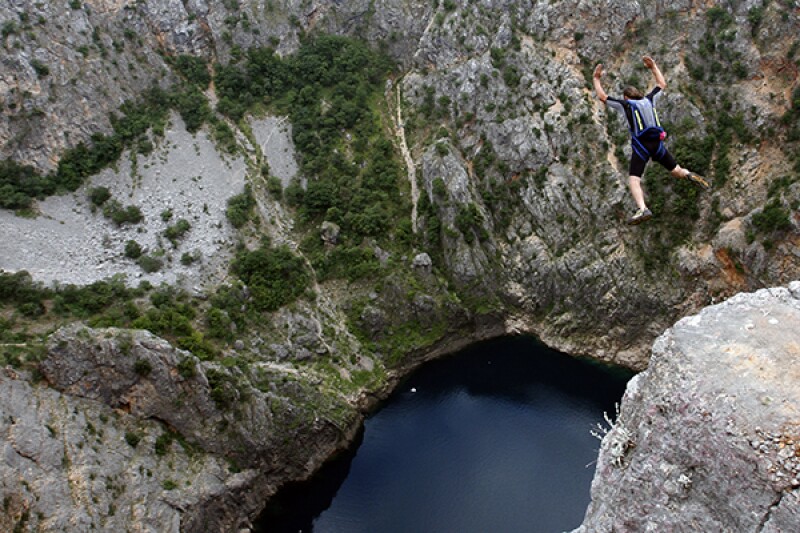
|
Taking the plunge in Croatia: but whose political parachute will open in time? |
Croatia shed points in Euromoney’s risk survey in Q1 2016, and is odds on to lose some more in Q2, with contributing experts still losing faith in a borrower that remains unconvincing compared with other countries in the region.
Bulgaria, Hungary and Romania, all tier-three sovereigns, are improving in the survey, but preliminary data for Q2 2016 show Croatia marked down again as the tier-four sovereign moves further from the possibility of investment grade. Romania is rated investment grade by all three agencies, Bulgaria by two and Hungary’s reputation was recently restored – as ECR data predicted – after an upgrade by Fitch.
Yet Croatia is still junk status, with all three agencies attaching a negative outlook:

|
Positive signs but…
Economic growth returned last year for the first time since the financial crisis struck in 2008, and tourism is booming partly due to the fact terrorism-affected MENA markets are now off-limits; although, to be fair, Croatia has also built-up its own reputation in the summer holiday market.
The country is running a current-account surplus, supported by tourism receipts and EU funds for investment. The fiscal deficit has narrowed, too, from the 5% of GDP level in previous years to 3.2% in 2015, aided by budget cuts to wages, subsidies and public-sector capital spending pushing the primary balance into surplus.
European Commission forecasts show the deficit falling to 2.7% of GDP this year, and to 2.3% in 2017, just enough for the gross debt burden to peak at 87% of GDP and start falling.
Yet there are considerable risks to this scenario, which include a return to public investment growth and excessive civil-service wage agreements weighing on state expenditure.
There are also the negative effects of the conversion of Swiss franc-denominated mortgage loans to local currency, alleviating the household burden but undermining profitability in the banking system.
However, Croatia’s problems extend beyond economics to factors that are more political, resulting in lower scores for institutional risk, the regulatory and policy environment, and government stability during the past year.
The coalition government is in a fragile state, beset by an impending parliamentary vote of no-confidence, filed by the opposition Social Democratic Party, which is raising the possibility of fresh elections.
Tomislav Karamarko, leader of the Croatian Democratic Union (HDZ) and a deputy to the technocrat prime minister Tihomir Oreškovic, is at risk of being dismissed, along with Božo Petrov, his fellow deputy and leader of the other coalition party Most.
HDZ in turn is pursuing a similar showdown to remove Oreškovic, and the upshot might be an early poll, another hung parliament and delays to the reforms Oreškovic proposed.
Erste Group economists, contributing to ECR’s survey, write: “The no-confidence motion against Croatia’s deputy PM Karamarko – leading the largest and ruling party in the government – prompts questions about political stability.
“The political situation in Croatia is still unclear and it is very hard to make any sound predictions. The probability of early elections is clearly on the rise, but a reshuffle of the government would be more rational for coalition parties HDZ and Most, as both could be strongly hit in snap elections.”
Nationalist tone
This political conflict is taking place against the backdrop of anxiety over the nationalist tone the government is taking. Popular protest against the government meddling in education reforms has seen tens of thousands take to the streets of Zagreb and other provincial cities amid fears of a purge of the media with anti-liberal leanings.
Kristina Pukšec, at InterCapital Securities, believes the political uncertainty will soon be settled, with snap elections the most likely scenario.
That view is echoed by Aljoša Šestanovic from Effectus, a Zagreb university, who says: “The current political environment is very tense. New elections are a viable and quite realistic option, which, according to the latest opinion poll, is supported by three-quarters of Croatian citizens.
“A few weeks ago, Croatia did not manage to issue Eurobonds on the international market for €1 billion as planned, as investors requested an additional premium on the yield. Thus, the complex political situation is creating the fear of pushing up borrowing rates, and affecting the economy.” Things should eventually settle down, but once again Croatia is demonstrating its ability to produce political risk even when the economy is at last beginning to show more favourable trends.
This article was originally published by ECR. To find out more, register for a free trial at Euromoney Country Risk.